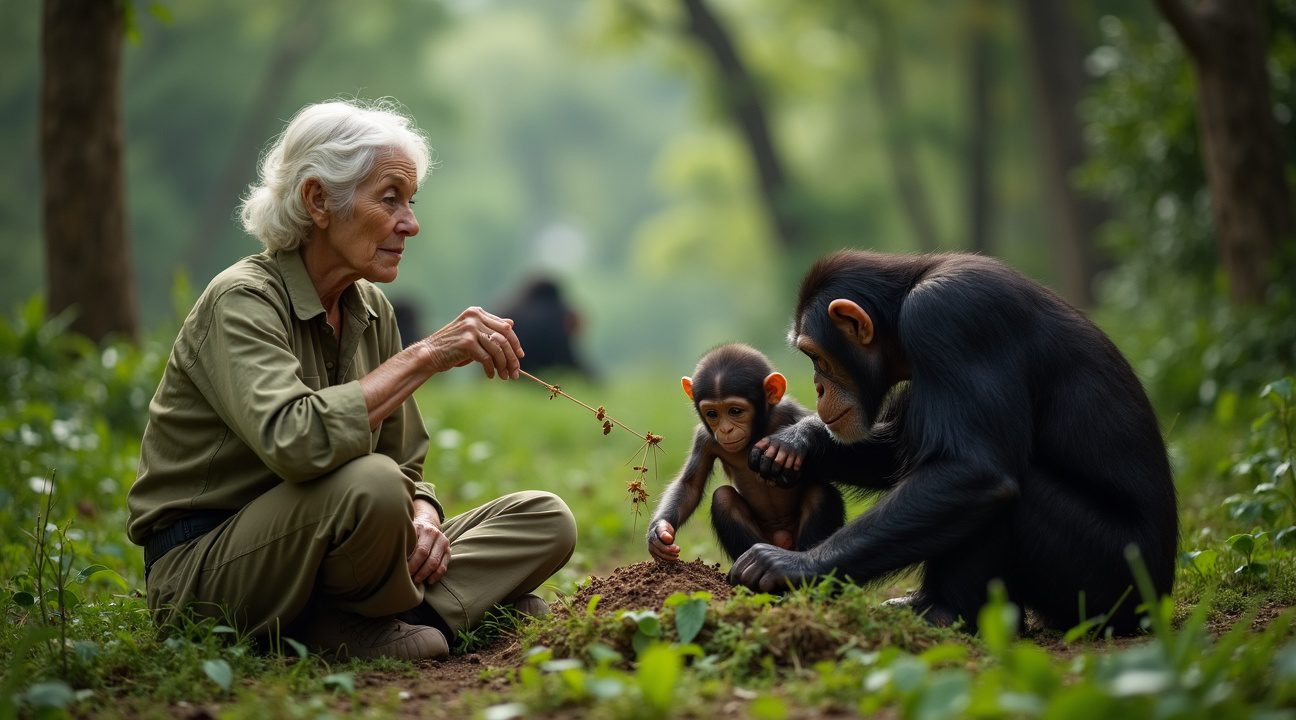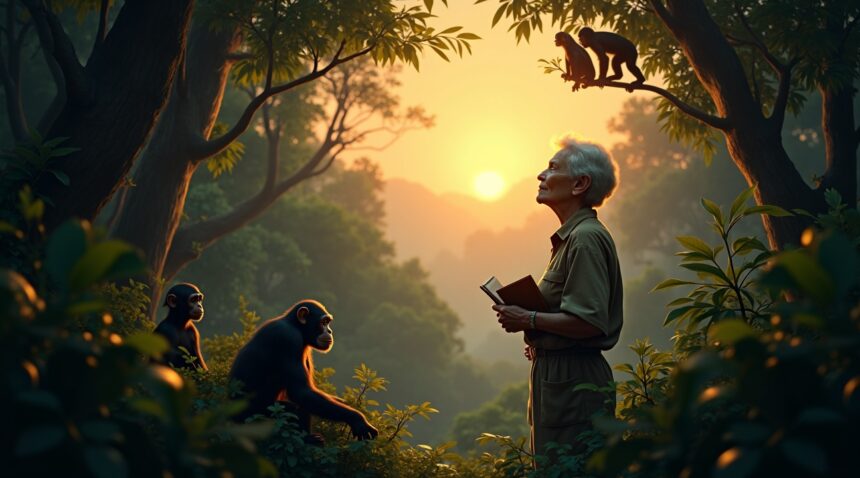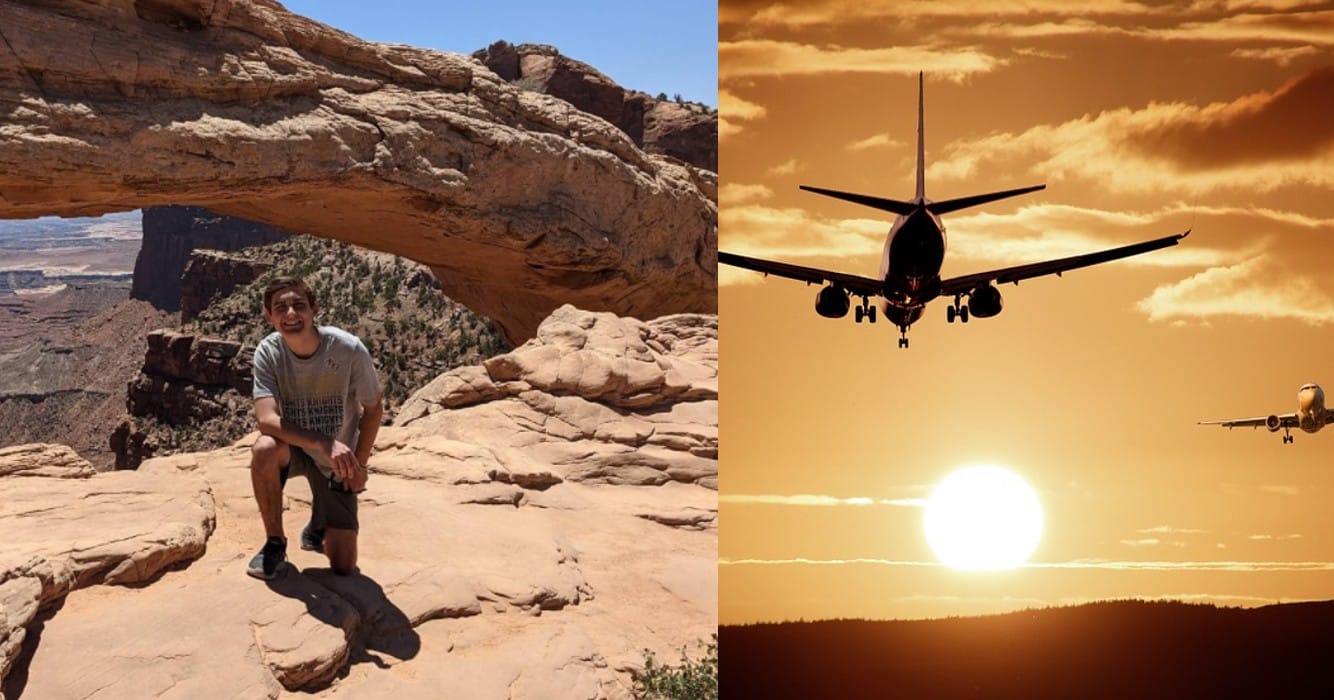Revolutionary primatologist Jane Goodall passed away on October 1, 2025, at age 91 in Los Angeles, marking the end of a remarkable six-decade career that fundamentally transformed our understanding of animal behavior and conservation science.
Her groundbreaking research with chimpanzees at Tanzania’s Gombe Stream National Park, combined with her global conservation initiatives—including the Jane Goodall Institute and Roots & Shoots program—created an enduring legacy that continues to influence scientists and environmental advocates worldwide.
Key Takeaways
- Goodall revolutionized primatology by discovering that chimpanzees use tools, possess complex emotional lives, and exhibit distinct cultural behaviors that vary between communities.
- Her unconventional research methods of close observation and naming animals rather than numbering them fundamentally changed how scientists approach animal behavior studies.
- She transformed from a secretary into a world-renowned scientist, demonstrating that passion and dedication can override traditional academic pathways.
- The Jane Goodall Institute and Roots & Shoots program now operate in over 60 countries, empowering young people to become environmental stewards and community leaders.
- Her numerous accolades included being named a UN Messenger of Peace, receiving the Presidential Medal of Freedom in 2025, and being made a Dame Commander of the British Empire.
Revolutionary Primatologist Jane Goodall Dies at 91 in Los Angeles
Jane Goodall passed away on October 1, 2025, at the age of 91 in Los Angeles, California. Her death brings an end to an extraordinary chapter in the history of primatology and conservation science that spanned over six decades.
The scientific community worldwide has responded with an outpouring of tributes recognizing Goodall’s transformative impact on our understanding of animal behavior and intelligence. World leaders, conservationists, and fellow researchers have shared heartfelt remembrances celebrating her pioneering work with chimpanzees in Tanzania’s Gombe Stream National Park. Her revolutionary research methods, which involved close observation and naming rather than numbering the animals she studied, fundamentally changed how scientists approach animal behavior studies.
A Legacy That Transcends Science
Goodall’s contributions extended far beyond her groundbreaking primatology research. She dedicated the later decades of her life to environmental conservation and youth education through initiatives like the Jane Goodall Institute and Roots & Shoots program. These organizations continue to operate in over 60 countries, empowering young people to become environmental stewards and community leaders.
Her death joins a series of notable losses in recent years, including Olivia Newton-John’s passing and other cultural icons who left lasting impacts on their respective fields. Just as Queen Elizabeth II’s death marked the end of an era, Goodall’s passing represents the conclusion of a pioneering period in conservation science.
Continuing Her Mission
The institutions Goodall established will carry forward her mission of protecting wildlife and inspiring future generations. Her approach to conservation emphasized the interconnectedness of human communities, animal welfare, and environmental health. This holistic philosophy continues to influence conservation strategies globally.
Goodall’s work earned her numerous accolades throughout her lifetime, including:
- Dame Commander of the British Empire
- UN Messenger of Peace
Her research fundamentally altered scientific understanding of what it means to be human by demonstrating the complex emotional and social lives of our closest animal relatives.
The loss resonates particularly deeply within the conservation movement, where Goodall served as both a scientific pioneer and moral compass. Her belief that every individual can make a difference inspired countless activists and researchers to pursue careers dedicated to protecting the natural world.
Groundbreaking Discoveries That Changed Our Understanding of Chimpanzees
Jane Goodall’s revolutionary work at Gombe began when she was just 26 years old, embarking on research that would fundamentally transform how scientists viewed our closest living relatives. Her patient observations in the Tanzanian forests challenged decades of scientific assumptions and established entirely new frameworks for understanding primate behavior.
Tool Use and Cognitive Capabilities
Goodall’s most famous discovery came early in her research when she observed chimpanzees fashioning tools from grass stems and twigs to extract termites from their mounds. This behavior shattered the prevailing scientific belief that tool use was uniquely human. She documented how chimps would carefully select appropriate materials, modify them by stripping leaves, and even prepare multiple tools before approaching termite mounds.
The implications extended far beyond simple tool use. Goodall noted that different communities of chimpanzees developed distinct techniques for termite fishing, suggesting cultural transmission of knowledge between generations. Some groups would use single probes while others employed a two-tool system, demonstrating sophisticated problem-solving abilities and learned behaviors that varied by location.
Complex Social Structures and Emotional Lives
Through years of careful observation, Goodall revealed that chimpanzees possessed rich emotional lives and intricate social relationships. She documented lasting family bonds that extended well beyond typical mother-infant relationships, observing adult siblings maintaining connections throughout their lives. Her research showed that chimpanzee mothers could grieve the loss of their offspring, sometimes carrying deceased infants for days.
Goodall also discovered the political nature of chimpanzee communities, observing alliance-building, reconciliation behaviors, and power struggles that paralleled human social dynamics. She witnessed acts of altruism alongside instances of violence, painting a complex picture of beings capable of both compassion and calculated aggression. These observations revealed that chimpanzees possessed distinct personalities, with some individuals being more aggressive, others more nurturing, and some displaying remarkable leadership qualities.
Her dietary discoveries proved equally significant. Previous assumptions held that chimpanzees were primarily vegetarian, but Goodall documented their omnivorous nature, observing them hunting smaller primates and sharing meat within their communities. This finding added another layer to understanding their behavioral complexity and social cooperation.
Working alongside anthropologist Louis Leakey, Goodall established the Gombe research camp that became a cornerstone of modern primatology. Leakey’s support proved crucial in legitimizing her unconventional approach, which relied on long-term observation rather than traditional laboratory studies. Her methodology of naming rather than numbering the chimpanzees, while initially controversial in scientific circles, allowed for deeper understanding of individual personalities and relationships.
These discoveries didn’t just change scientific understanding; they forced humanity to reconsider its place in the natural world. Just as Queen Elizabeth II transformed modern monarchy through her long reign, Goodall’s work transformed our relationship with the animal kingdom. Her findings bridged the gap between humans and other primates, revealing cognitive abilities and emotional depths that challenged the notion of human uniqueness.
The impact of her research extended into conservation efforts, as understanding chimpanzee intelligence and social complexity made their protection more urgent. Her work demonstrated that these animals weren’t just subjects for study but beings deserving of respect and protection. Through decades of research, Goodall proved that chimpanzees possessed capabilities once thought exclusively human, fundamentally altering both scientific understanding and ethical considerations regarding our treatment of other species.
Her legacy continues to influence modern primatology, with researchers building upon her foundational discoveries to explore even deeper aspects of chimpanzee cognition and behavior.

From Secretary to World-Renowned Scientist: The Unlikely Journey
Jane Goodall’s path to scientific fame began in the most unexpected way. Born on April 3, 1934, in London, England, she showed early signs of her future calling when she received a stuffed toy chimpanzee named Jubilee at just one year old. This simple gift sparked what would become a lifelong fascination with animals that would eventually reshape our understanding of primate behavior.
Her early career took conventional turns that few would associate with groundbreaking scientific achievement. After leaving school at 18, Goodall worked as a secretary, handling routine administrative tasks that seemed far removed from the African wilderness where she would later make her mark. She then transitioned to work as a film production assistant, gaining experience in an industry that would later prove valuable in documenting her research findings.
The African Adventure That Changed Everything
Goodall’s life took a dramatic turn when she decided to embark on her transformative journey to Africa. This decision marked the beginning of an extraordinary scientific career that would challenge established research methodologies and redefine how scientists study animal behavior. Her choice to leave behind the familiar comforts of London for the unknown challenges of African fieldwork demonstrated the same courage that would characterize her entire career.
What set Goodall apart from her contemporaries was her distinctive approach to observational research. Instead of maintaining the traditional scientific distance between researcher and subject, she chose direct immersion in the natural environment of her study subjects. This unconventional methodology initially drew criticism from the established scientific community, yet it would prove to be her greatest strength.
Her groundbreaking insights into animal behavior emerged from this hands-on approach. By living among the chimpanzees she studied, Goodall observed behaviors that had never been documented before. She witnessed tool use among chimpanzees, recorded complex social interactions, and documented emotional bonds that challenged the prevailing scientific view that such traits were uniquely human.
These observations established her reputation as a pioneering primatologist whose work would influence generations of researchers. Her findings forced the scientific community to reconsider fundamental assumptions about animal intelligence and emotional capacity. Much like how other notable figures have left lasting impacts in their fields, Olivia Newton-John’s legacy transcended her primary profession, Goodall’s influence extended far beyond traditional primatology.
The transformation from secretary to world-renowned scientist illustrates how passion and determination can override conventional career paths. Goodall’s story resonates with anyone who has felt called to pursue an unconventional dream. Her willingness to abandon societal expectations and venture into uncharted territory both literally and professionally created opportunities that wouldn’t have existed otherwise.
Her research methods, initially viewed with skepticism, eventually became accepted practice in behavioral studies. The scientific community came to recognize that her intimate approach yielded insights that traditional observational methods had missed. This validation came gradually, as her findings accumulated and their significance became undeniable.
Goodall’s journey also highlights the importance of early influences in shaping future achievements. That simple stuffed chimpanzee, Jubilee, represents how childhood experiences can plant seeds that bloom into life-defining passions. Her story demonstrates that significant scientific contributions don’t always emerge from formal academic training but can spring from genuine curiosity and dedication to understanding the natural world.
The unlikely progression from office work to scientific pioneering shows that traditional career trajectories aren’t the only path to meaningful achievement. Goodall’s willingness to take risks and follow her instincts led to discoveries that continue to influence animal behavior research today. Her legacy proves that sometimes the most important scientific breakthroughs come from those willing to question established methods and forge their own path.
Global Conservation Empire Built on Scientific Foundation
Jane Goodall transformed her groundbreaking chimpanzee research into a powerful conservation empire that spans the globe. In 1977, she founded the Jane Goodall Institute, creating an organization dedicated to advancing conservation efforts through scientific research and community-centered approaches. This institute became the cornerstone of her expanding influence beyond the forests of Gombe.
Inspiring the Next Generation Through Education
Recognizing that lasting environmental change requires youth engagement, Goodall launched the Roots & Shoots program in 1991. This initiative empowers young people worldwide to tackle conservation and humanitarian challenges in their own communities. The program operates on the principle that every individual can make a difference, encouraging students to develop projects that address environmental issues, animal welfare, and human needs.
Roots & Shoots has since grown into a global network spanning over 65 countries, with hundreds of thousands of participants ranging from kindergarten students to university graduates. These young conservationists work on diverse projects, including:
- Protecting local wildlife habitats
- Organizing community clean-up efforts
- Promoting sustainable practices
Recognition and Global Leadership
Goodall’s contributions to science and conservation earned her unprecedented recognition from international organizations and world leaders. She was appointed as a UN Messenger of Peace, a role that amplified her voice on critical environmental issues and provided her with a platform to advocate for conservation policies at the highest levels of global governance.
Her accolades continued to accumulate throughout her life, culminating in receiving the Presidential Medal of Freedom in 2025. This honor recognized not only her scientific achievements but also her decades-long commitment to environmental advocacy and her ability to inspire positive change across generations.
The Jane Goodall Institute continues to expand its reach through innovative conservation programs that blend scientific research with community engagement. The organization’s approach recognizes that effective conservation must involve local communities as partners rather than obstacles, ensuring that environmental protection efforts support human livelihoods while preserving wildlife habitats.
Goodall’s legacy extends far beyond her scientific discoveries about chimpanzee behavior. Her ability to translate complex environmental challenges into accessible messages for global audiences has inspired countless individuals to pursue careers in conservation science. Many of today’s leading primatologists, conservationists, and environmental advocates cite her work as their initial inspiration.
The conservation empire she built operates on multiple fronts simultaneously, addressing immediate threats to endangered species while also working on long-term solutions to environmental degradation. This comprehensive approach has influenced how modern conservation organizations structure their programs and engage with diverse stakeholders.
Through strategic partnerships with governments, academic institutions, and grassroots organizations, the Jane Goodall Institute has demonstrated that effective conservation requires collaboration across sectors. This model has been replicated by numerous other conservation organizations, creating a multiplier effect that extends Goodall’s influence far beyond her own organization.
Her scientific foundation provided credibility that enabled her to engage with policymakers, business leaders, and community organizers on equal footing. This combination of rigorous research credentials and passionate advocacy created a unique platform for promoting conservation messages that resonated with diverse audiences worldwide.
The ongoing work of environmental stewards inspired by Goodall’s example continues to address emerging conservation challenges, from climate change adaptation to wildlife trafficking prevention. Her emphasis on hope and individual action has created a generation of conservationists who believe in their ability to create positive change, much like other inspiring figures who have passed away after leaving lasting legacies.
Goodall’s conservation empire represents more than just institutional success; it embodies a fundamental shift in how humanity approaches its relationship with the natural world. Her work has demonstrated that effective conservation requires both scientific rigor and emotional connection, creating lasting change through education, inspiration, and community engagement.
Sources:
Jane Goodall Institute – Global Conservation Empire Built on Scientific Foundation
None – Revolutionary Primatologist Jane Goodall Dies at 91 in Los Angeles
None – Groundbreaking Discoveries That Changed Our Understanding of Chimpanzees
None – From Secretary to World-Renowned Scientist: The Unlikely Journey


